|
War Doesn’t Want War doesn't want to be an arcade game, doesn't want an enemy a blip on the radar screen. It doesn't want a victor with the best eye-hand coordination. It wants the thrill of killing at intimate range, wants the torch, the stench of singed flesh (the skin tastes best). It hates dining alone, making death with strangers. It wants to know what it's eating. 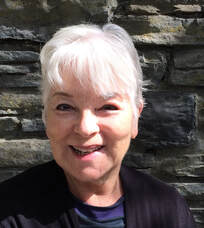 Barbara Goldberg (Montgomery County, MD), poet, translator and essayist, is Series Editor of The Word Works’ International Edition’s.
0 Comments
DC Farmer’s Market In the Land of Plenty, carrots congregate. Dusty yellow and saffron sticks call on Carotene to work its power to the people, strolling aisles of an urban farmer’s market. Rows of verdant spinach sparkle iron-rich, nestled next to nectarines. Orange oracles ooze Vitamin C, their citrus scent reminiscent of Paradise. In the Land of Plenty, in this Paradise, this Fruitopia I watch a hunched homeless woman emptying her voluminous pockets to find change for cherries. Cherries gleam like garnets, these round promises of summer. The long-bearded farmer refuses her change. Gently placing orbs of glistening, rain-kissed fruit in her hands he says, “These are for you.” She smiles beamingly through toothless grin. “Just be careful of the pits, ma’am. And please come back next week. We have plenty to share.” In this Land of Plenty, there are 800 million more people to nourish with Earth’s bounty. In this Land of Plenty, we’ll grow goodness from seed. 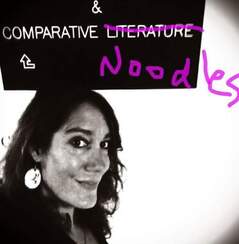 Rachel Carillo (Montgomery County, MD) is a Noodle Expert, poet, gig-economy writer, social and climate activist, share-economy denizen and public transportation devotee. With a Master's degree in International Studies, she has traveled extensively, lived bi-coastally and skied the Southwest as a Mountain Girl. She is currently on a search for home while writing her first novel. Mother Hunger stares at me With those empty eyes, Parched lips, Protruding belly, And the bigness of - A world awry Starvation hopes at me With a bucket brimming with The golden kernels of A million dollar sunset Offset by the rambling Road to rescue Death fills me With endless knowing Of another mother rocking Her starving baby One last time To sleep 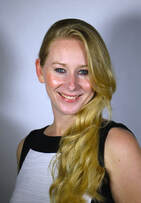 An internationally recognized food justice leader and specialist, Liz Reitzig has recently presented her memory- and nature-infused poetry at readings throughout the County. She is a mother to five amazing children and lives in Prince George’s County, MD with her family. Fried Tomatoes My mother didn’t drive a car and so my father would leave her money for the week, and she’d have to walk for groceries and couldn’t always manage, but if an unexpected visitor dropped in she always had tomatoes. These would be fried and put on toast with cream sauce on top. We always had milk and flour. Sometimes Uncle Freddie came by on his bicycle after delivering things people ordered from stores, carried in his bike basket. He was fifteen and saving money to be a lawyer. He wore a tweed cap and woolen knickers. Uncle Freddie died last week at a hundred and one. If my mother was surprised by her brother, she would fry up some tomatoes. When I walked home from school for lunch and she served them I knew she wasn’t able to walk up to the store. And today when I opened the refrigerator after two weeks away, and just out of bed with the flu, I saw two fat tomatoes alone on the shelf. I always have tomatoes. So, I’ll slice them in olive oil and salt until slightly burned on the edges then scoop everything on two pieces of toast and if I close my eyes, I’ll see a yellow kitchen with squares of sun on the linoleum floor, and my uncle, one last time grabbing his hat, and running out the door. 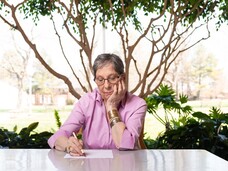 Grace Cavalieri (Anne Arundel County, MD) is Maryland's tenth poet laureate. She founded and still produces "The Poet and the Poem" for public radio, celebrating 43 years on-air. Her forthcoming book (2020) is What The Psychic Said. Under the Bridge it must have been the summer of 1955 in Fukuoka, Japan. I was just six. my father was the American consul in the city. my mother was taking me with her on her morning rounds. our last call at noon was to a deserted area in a part of the city unfamiliar to me. we parked off the road in a dirt lot and walked down a crooked path to the edge of a small river. there was broken concrete lying around in the glaring hot sun. I asked my mother what we were doing. She said we were visiting someone she knew who lived under the bridge. we got down into the shade under the bridge. my mother called. she walked around and called some more. she was in a summer dress and proper shoes. She was calling out in Japanese. she turned to me and said in English: “they must be out.” we could see some clothes lying in heaps and pans and stuff in a makeshift area under the bridge. as we were leaving, my mother put down a see-through plastic bag of hard candy, the kind you suck and crack your teeth on. she left the candy by one of the pans. we made our way back up the river bank up to the car and drove off into our life full of food and things to do. the consul’s wife could not solve their hunger but she could leave a little bit of sweetness and, at the same time, teach her son that not everyone had enough to eat. 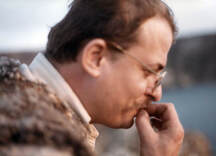 Q.R.Quasar (aka David Martin ) is a poet, playwright, novelist & scholar/translator of Arabic & Persian poetry & philosophy (Ph.D., UCLA). His books are available from Global Scholarly Publications (www.gsp-books.org.): Watching the Universe Die, The Universe in Bloom, Ocean of Suns, Buddha Time, etc. Q.R.Quasar lives in Montgomery County, MD. Shrimp I didn’t know I was hungry. I liked peanut butter sandwiches. Rice was good, with Kool-Aid. So, everything was the same. I didn’t understand any differently. My father was a poor law student, my mom working at the Sizzler. There wasn’t enough money to spread through a month. What kept us fed, my mom said later, was the shrimp my uncle brought, covered in ice, in a red cooler. I don’t think we can repay him, despite our differences in opinions. He was a shrimper on the coast, as the seafood started to give out in the Gulf, as he settled down, and the food he provided me would later allow me to get seasick, fearful of falling off any boat, unable to swim like a shrimp. 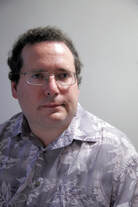 Donald Illich (Montgomery County, MD) has published poetry in journals such as Poet Lore, The Iowa Review, and Map Literary. He recently published a book, Chance Bodies (The Word Works, 2018). I Consider I consider-- I used to bring my infusion nurse chocolates because I dug the way Eli took care of the woman who vomited next to me. She was two decades younger with a mass of black curls we both knew she would lose. Her husband sat in the chair next to her, fidgeting with his backpack strap while she got sick. I knew how the poison made her veins taste like menthol and food taste like chewing bullets. I wanted to suggest plastic forks, but I left it to Eli, the nurse, to silently give my Cancer neighbor an extra pillow and ginger ale in a Styrofoam cup. I consider-- I am well now. Yesterday, I sucked down half a pound of shrimp and almost as many fried pickles. I stuffed my face with seafood and the South after sun and baseball and beer, and I couldn’t help but remember that, even when I was strapped in that chair hooked up to dripping venom, I knew that it would end. I would eat again. I consider-- When true hunger gnaws, with no respite, our stomachs shrink to walnut size, and our bodies reject sustenance even when it’s offered. Now, with a nation not well, with land fracked and skies fried, with fields of golden hair we all know we will lose, I consider. I shudder. Then the bile rises-- Again.  Sally Toner is a high school English teacher who has lived in the Washington DC area for almost 25 years. Her work has appeared in Gargoyle Magazine, The Watershed Review, The Delmarva Review, and other publications. Through this soil, we connect Hard work, yes Good work, honest work but these hands are humble, too Planting and pulling food straight from the belly of the earth in the hopes that it goes on to fill other bellies in other places Perhaps even now hands that have never touched the soil are touching the earth through me as they lovingly embrace a fresh peach or pear or plum So too, do they embrace me. 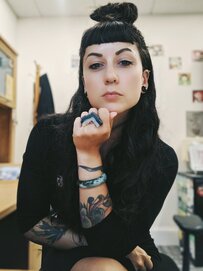 Reana Kovalcik lives and works in Washington DC, where she leads communications for a sustainable agriculture-focused organization. Reana is a lifelong lover of literature, writing, and poetry. Eat These Words Like your own mother She wants only Healthy children in school Bright eyes and brains The small farmer Sweat rolls from her face Pointed stick planting hoe weeding Food only if it rains The well is all day Every day 25 meters down rubber bucket For drinking washing cooking every thing Family needs water you know Rural electrification Brings green rice fields and income Time and pumps and spigots and vegetables Schools too sprout and grow Educating her daughters Feeding every child’s mind This woman smiles Like your own mother 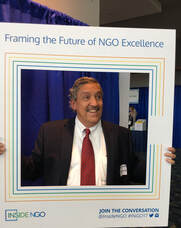 Paul Guenette (Montgomery County, MD) is a recently retired economic development manager with expertise in international agribusiness. Mr. Guenette designed and managed development programs in a career spanning 45 years and 90 countries. WISE CHILD Most of us, I think, aren’t doing our best. We don’t share goods, we do not trust. Except one eight year-old American girl whose parents came from Palestine, wrote a poem in school with this refrain: “Let the parents of your friend like your parents, and your parents like the parents of your friend.” May that verse be our mantra, breathed, printed for all to see in her charter school’s annual book of second-grade pupil’s poems. Pencil in her fingers, clarity of her truth in class, of San Francisco’s angelic youth! Who cares she does or doesn’t rhyme? Her words do mean to set the world aright: “Let parents of our friend like our parents, and let our parents like the parents of our friend.” May other pencils write as well to the heart of it. Listen to her; learn as in school, as from a great soul, like mahatma Gandhi, who said For hungry people, the only form in which God dare appear, is food. Learn from her as from the Reverend Martin King, Jr. who knew that anger is a species of fear, just an energy to fuel his army of ahimsa. Many of us are still angry. Much work waits to be done, as we swim separately in schools. Do you ken what I am keening about (Such selfishly gated greed, so heedless of injustice)? Our unfair land languishes for this girl’s banquet. Let earth be shared, hate cleaned from the slate. Every body of us hungry, might fight with fierce frown, Old alma mater keeps Fear’s flag a-flying. I’m just asking, some troubled citizens were wondering: Could we harbor that vision in our own warm bosoms? May we too, say: “Let parents of our friend like our parents, and let our parents like the parents of our friend.” 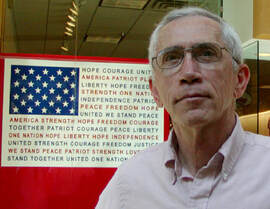 Max Ochs (Anne Arundel County, MD) has spent over 60 years trying to write one decent poem. He has not yet succeeded, but along the way he has met met some amazing poets. |
PoemsThese poems were recognized at the 2019 WFD Poetry Competition ArchivesPoets
All
|
 RSS Feed
RSS Feed